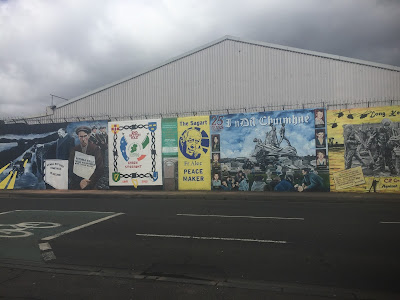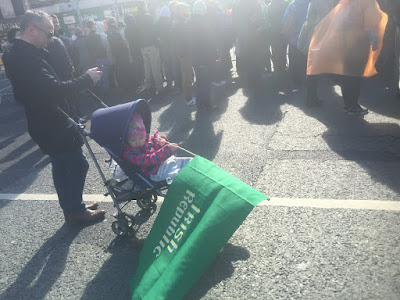The second weekend of October, Pierre and I went back to his
family’s home, the converted mill at Spoir, for the opening of hunting season.
The family has a fair amount of wooded land, and has managed it to support native
wildlife—deer, grouse, ducks, woodcocks (go on, giggle), and hares. Pierre grew
up hunting on their land; both he and his mother are hard of hearing in one ear
from the cumulative sound trauma of shooting. The Deckers are hardly a family
in the Duck Dynasty mold, but they are a family of hunters. This may surprise
those who consider guns and hunting a uniquely American obsession; while it is
true that it’s less common in France as a whole, in rural areas like Spoir it
is no less deeply engrained than in rural Virginia.
That said, while I grew up the daughter of a hunter, I have
never personally taken to it, so I recused myself from an active part in the
opening hunt. I have accompanied Pierre hunting before, although never with the
aim of being useful; think the duck hunting scenes in Downton Abbey, where the
ladies stand beside the men making small talk and drawling “Oh, well done”. It's not because I'm a lady, it's because I have no interest in shooting but a keen interest in being in the woods. For the opening weekend Pierre’s father had organized a hunting party of
ten, however, so the stakes were rather higher. While I resented the implicit gender
narrative of not joining, I knew it would be worse if I joined but declined to
shoot, so I bowed out.
Saturday morning brought crisp fall air, and the courtyard
of the mill began to fill up with men and dogs. Someone had brought a bag of
croissants, and everyone stood around sipping coffee, changing into boots, and
munching on pastries. Finally Mr. Decker started to draw lines in the gravel to
map out the plan for the morning, and the hunters trooped off.
 |
| The Moulin de Vilaine, although on a different day, with Pierre in farmer mode rather than hunter mode. |
I rejoined them for lunch at the Moulin de Vilaine. Unlike
the Moulin de Spoir, this mill has not been reconverted into a house; it is an
imposing, square tower with a massive fireplace and a long table inside. We
drank an aperitif outside on the grassy bridge that spans the remaining
watermill structure—although the mechanisms and wheel are long gone, the
architecture remains—then piled into the mill to eat.
 |
| What's left of the structure of the millwheel. |
And eat we did. Roger, a retired gardener with tufts of
white hair and bright, bird-like eyes, produced a rabbit terrine, a sort of
meatloaf of rabbit, pork, lard, onions, and seasoning. “We bagged the rabbit
last weekend!” he announced, then, anticipating the problematic math this
invoked at the weekend of the opening of hunting season, he added, “…with the
car, of course. Roadkill. Eat in small bites, there might be some asphalt.” He
spoiled the fib by winking largely, but no one seemed to mind, and the terrine
was delicious.
This was followed by the main course, pork in paprika sauce
and gratin dauphinoise, potatoes
swaddled in cream and garlic and baked into a swoon under a crunchy lid of
cheese. Bottles of wine were passed along the table, the hunters knocking back
glass after glass to wash down the rich lunch. “You are going out again after
this, right?” I asked incredulously. “I mean, with guns? You sure you’re not
going need a nap first?”
After a smelly cheese course we waded our way to dessert:
Mrs. Decker had made an enormous bowl of chocolate mousse, the annual end to
the hunting party lunch. It made its way around the table twice; unable to take
more, I tried to pass it back to the head, but Roger stopped me. “Non!” he
cried indignantly, scolding me as he snatched the bowl with his bony fingers.
“It would be a shame not to give this bowl back clean.” Someone else laughed.
“What are you planning on, sticking your whole head in there to lick it dry?”
Roger’s stern look implied he might just, if need required.
The team somehow waddled back out into the woods, and
Pierre’s friend Tof—also a non-hunter—picked me up in his bright orange Dyane
6. We spent the afternoon at the Chateau de Maintenon, the residence of the
infamous Madame of the same name, a marquise who became the mistress and later
secret wife of Louis XIV. The castle is beautiful, well kept, and informative
without being heavy-handed. It was built over centuries with different
materials, and the resulting aesthetic—that of a castle put together from the
spare parts of three other castles—is unique, and quite charming.
 |
| It was overcast all afternoon, but the sun came out just when I needed it for a great shot. Tof is, of course, rocking his signature orange foulard and round John Lennon-style sunglasses. |
The gardens, meticulously bordered in the French style with
trim hedges and swept gravel, look out onto a centuries-old aqueduct project
that never came to fruition. It was ordered by Louis XIV to re-route the waters
of the River Eure in order to keep the fountains in the gardens of Versailles fed
“day and night”. The Eure is the river that flows past the Deckers’ house at
Spoir; at one time there were mills every 500 meters along its length. It was a
vital source of water, agriculture, and livelihoods for the communities on its
banks, and yet had the project been achieved, it would have been diverted. This
capricious and entirely self-centered—not to mention unnecessary—desire, in
keeping with the absolute nature of the Sun King’s monarchy, drained the royal
coffers, led to the deaths of hundreds of workers over a decade in unsanitary,
swampy conditions, and left behind a 32-mile-long folly that stands today as a
reminder of exactly why the French of the 18th century were getting
so fed up with their kings.
 |
| Although for all that, it is pretty. |











